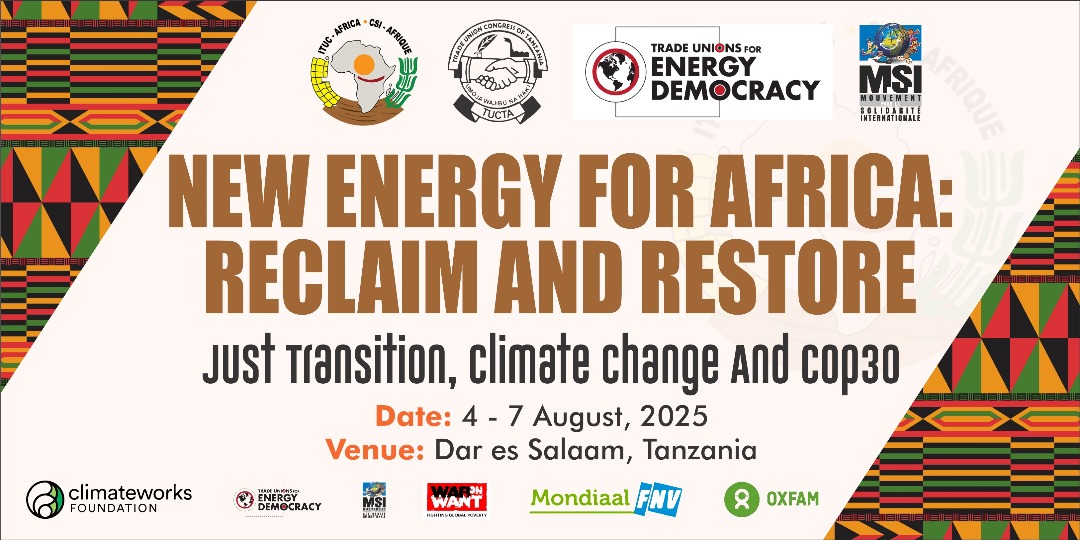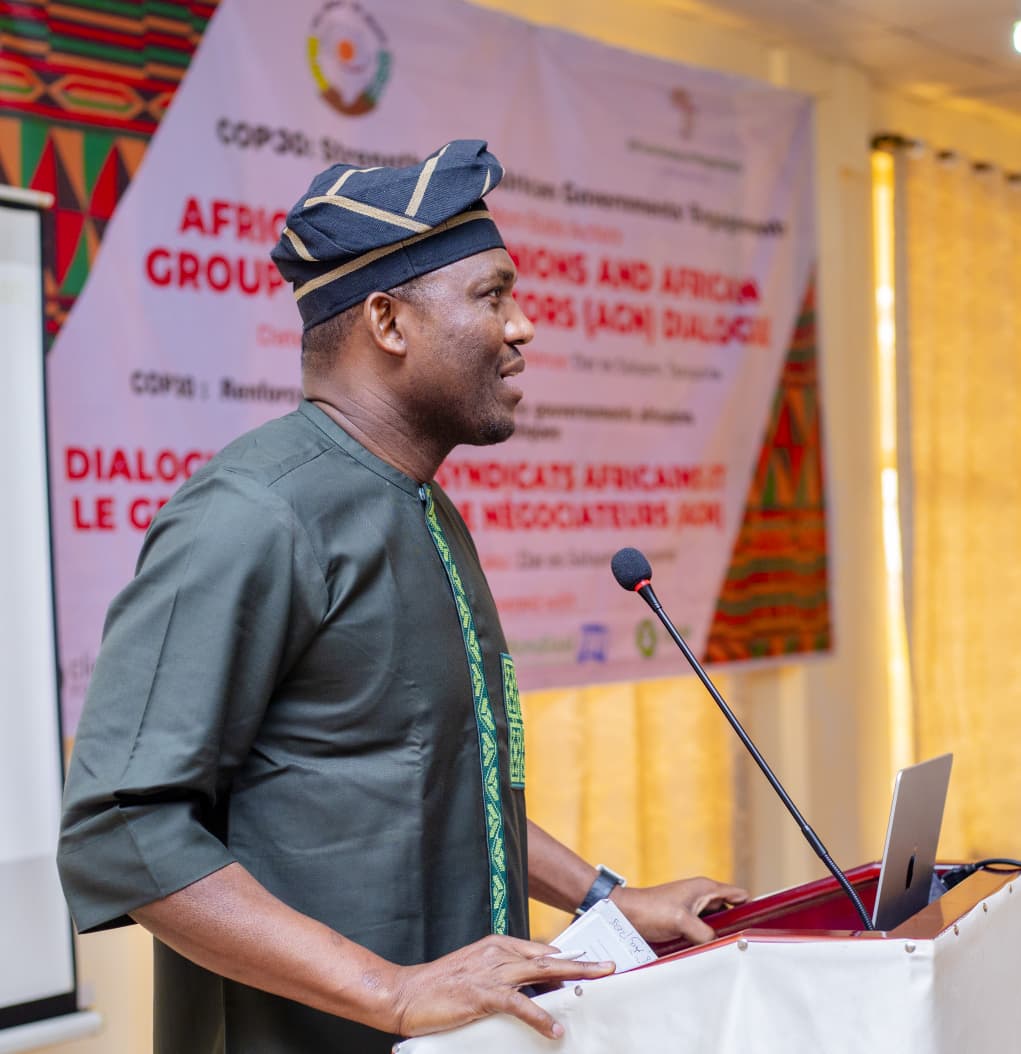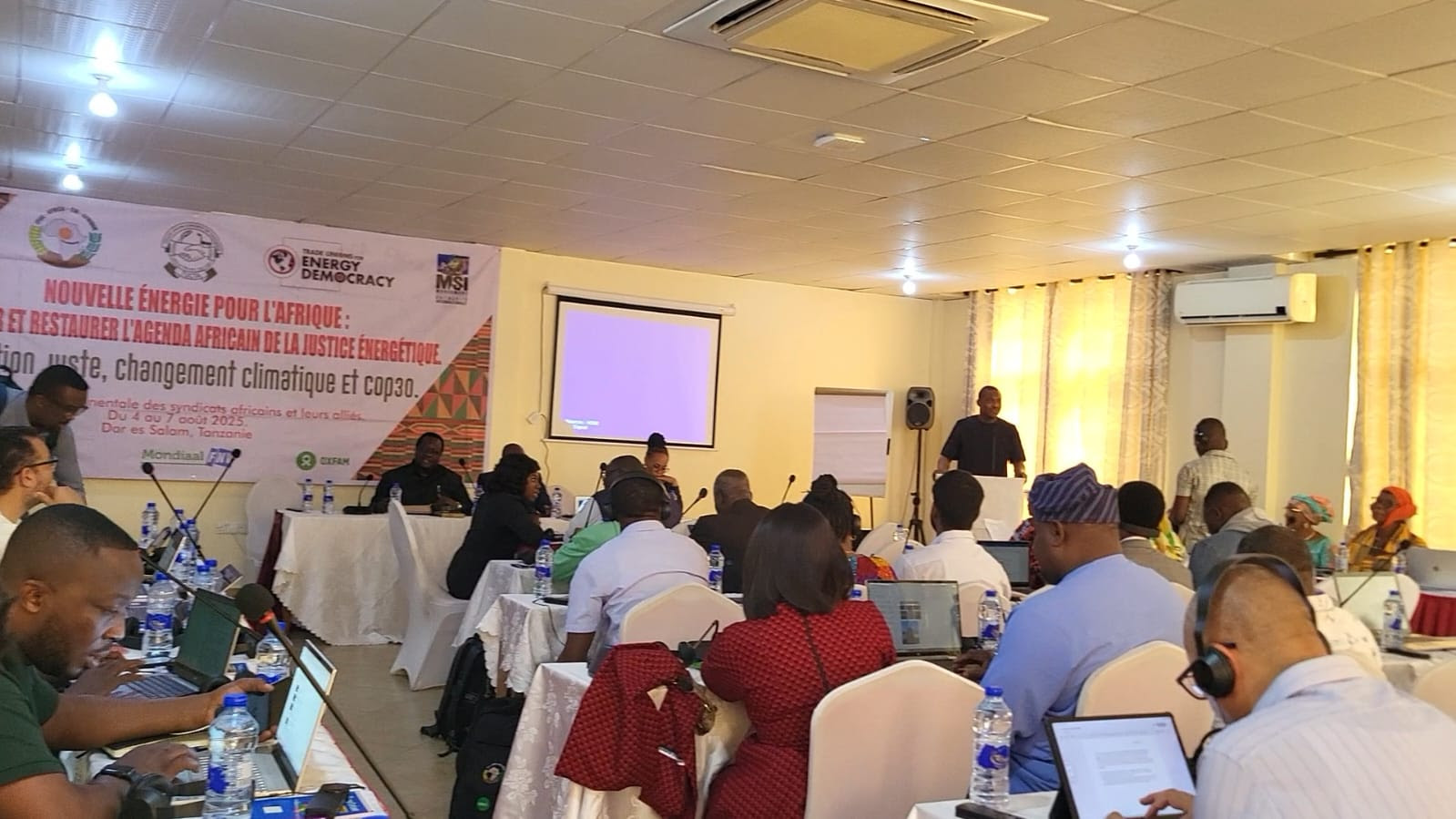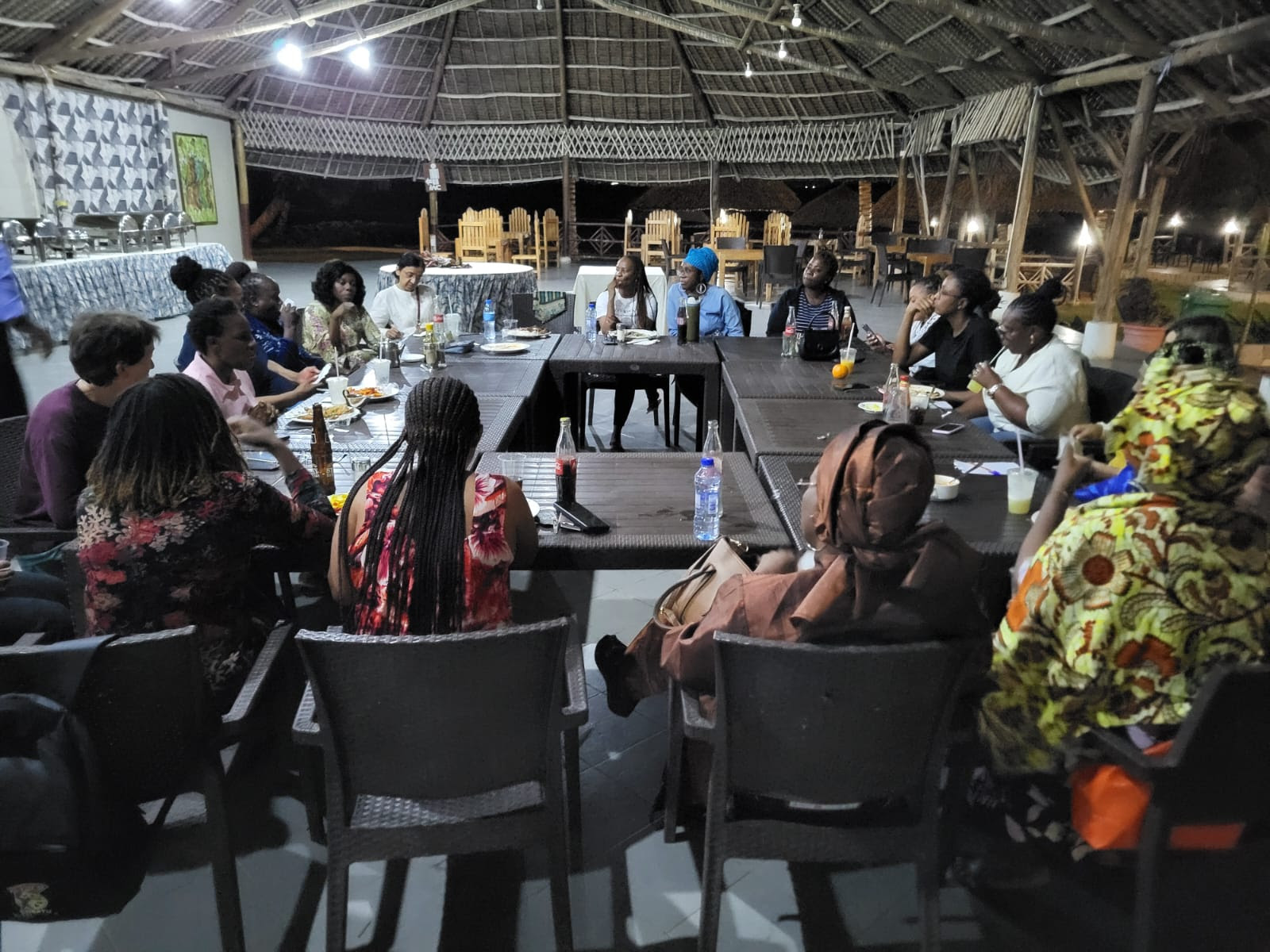
Representatives of African trade unions, global union federations from public services, energy, mining, transport, agriculture and industry convened in Dar es Salaam, Tanzania, from August 4th-7th, 2025, for a strategy conference themed: New Energy for Africa – Universal, Debt-Free, and Climate Secure.
Convened by the African Regional Organisation of the International Trade Union Confederation (ITUC-Africa), in partnership with TUED and allied solidarity networks, the 80 person gathering committed to forge strategic alliances among unions, social movements and progressive policy groups around three strategic goals, namely the public ownership and control of energy-related assets; liberation from the endless cycle of debt and exploitation, and advancing South-South cooperation to build climate resilient societies.

Opening the 4 day gathering, ITUC-Africa’s General Secretary Joel Akhator Odigie challenged the group to take a bold, transformative and movement-building approach to building public pathway options to achieve energy justice in Africa.
“The Dar convening focused on how to strengthen African trade unions' efforts and contributions to decolonise and reconstruct Africa's structurally colonised public energy pathways to advance the continent's industrialisation and development. As unions, we must go beyond demanding ‘a seat at the table,’ said Odigie.
In a declaration released on August 7th by ITUC Africa, unions and their allies committed to mobilise support for a broad-based campaign “reclaim and restore” public energy systems. It urged governments to advance public pathway alternatives to expand electrification by first repealing neoliberal energy laws that, for three decades, have imposed market criteria on public utilities.
But “cost-reflective tariffs” and mandatory “take or pay” power purchase agreements (PPAs) with for-profit independent power producers (IPPs) are chiefly responsible for 600 million Africans being without electricity, and the number is currently rising at a rate of roughly 20 million per year.
Day One of the gathering focused on the impediments to electrification and economic development more broadly. Tunisian scholar Fadhel Kaboub admonished the global institutions that have sought to keep Africa locked in a cycle of debt to the North, therefore increasing the pressure on Africa’s governments to export vital resources in order to meet debt servicing charges. “The World Bank is not a development bank, it is a means to keep Africa from using its ample resources for sovereign development and to bring to an end colonial forms of exploitation,” said Kaboub.

The Dar es Salaam declaration urged African governments to reject pro-privatisation policies such as the African Development Bank’s (AfDB) “Mission 300.” At a governmental energy summit organised around Mission 300 in January 2025 (also in Dar es Salaam) many African governments agreed to “incentivize private sector participation to unlock additional resources by creating an enabling environment through supportive regulations, effective fiscal policies with appropriate incentives, and innovative financing mechanisms grounded in cost-benefit analyses. Further, incentivize African investors and support the development of an African electricity industry.”
In a presentation outlining the need for a concerted campaign to reclaim and restore public utilities as a means of getting SDG7 back on track, TUED’s Sean Sweeney described how the AfDB’s 300 million electrification target will suffer the same fate as the AfDB’s previous initiatives. “Launched in 2016, the AfDB’s New Deal on Energy for Africa aspired to achieve 100% access in urban areas and 95% access in rural areas by 2025. Today the results are clear: the private sector did not show up. And private interests will not invest in electrification without guaranteed returns approaching 20% per year. This explains why more Africans are living in energy poverty today than was the case a decade ago.”
On Day Two, TUED’s Brian Kamanzi presented a visual on how reclaiming public utilities might unfold at the level of policy and politics, beginning with governmental assessments of “public pathway” alternatives, including “rebundling” of power utilities, progressive tariff reform, and reconstituting energy planning that is not beholden to the whims of private capital.
"Since launching the Reclaim and Restore initiative, TUED has worked to track, learn from, and share how trade unions across the Global South are fighting neoliberal energy policy. Building on each other's successes and struggles is essential for developing coherent campaigns rooted in our energy systems' history, and strengthening union positions,” said Kamanzi.


Systemic gender oppression has left women as the gender constituency facing the greatest levels of poverty, globally. New opportunities for a women’s liberation platform emerge alongside the commitment to build campaigns to “reclaim and restore” public energy systems, presented TUED’s Irene Shen on Day Two. Energy poverty disproportionately impacts African women who do the majority of domestic work without electricity and / or clean cooking fuels.
The “reclaim and restore” campaigns can advance a feminist agenda through energy access that reduces time spent on daily domestic chores and improve indoor air quality by increasing access to clean cooking fuels, a goal that the private sector has failed to do for decades. Electrification through reclaiming and restoring energy utilities has the potential to develop infrastructure for electricity demands beyond charging a cell phone or lighting a lamp, but to transform women’s material conditions and prioritize a women’s liberation agenda.
A women’s caucus on the evening of Day Three highlighted the work of the women participants in the trade union movement and the legacies of mentorship between women at the meeting, building a supportive foundation of relationships that will anchor the work as women collectively develop a feminist public pathway.
As Mavis Koogotsitse, Executive Secretary of the Southern Africa Trade Union Co-ordinating Council (SATUCC), reflected, “The women's caucus meeting was a powerful reminder of our collective strength, offering a platform for diverse voices and solidarity. It reinforced our shared commitment to empower women in our communities so we can tackle the challenges together.
Additionally we emphasized our dedication to mentorship, to ensure that younger women have the support, guidance, and opportunities they need to thrive, succeed and not shy away from taking leadership roles.”
Looking beyond the power sector, the Dar gathering declared support for UN Secretary-General Guterres’ call to strengthen governance of the global commons and for global public goods. This requires a radical overhaul of the multilateral financial system and an end to debt creating mechanisms like de-risking, “blended finance,” etc. that deepen inequality and weaken states.

The declaration from Dar es Salaam also condemned Israel’s genocidal assault on Gaza, and the “deliberate destruction of water and energy infrastructure [that] has killed Palestinians through dehydration, disease, and denial of medical care. This calculated weaponization of essential resources constitutes a war crime. We demand an immediate ceasefire, end to the blockade, and accountability for these atrocities. Palestine’s liberation is inseparable from our struggles for social and economic justice.”
The Declaration concluded, “We urge unions, communities, and progressive forces worldwide: Endorse this declaration and join our struggle for a debt-free, climate-secure, people-powered Africa. Our campaigns will reclaim Africa’s energy and mineral wealth for public good—not private profit. Together, we will block privatisation, expose corporate capture, and win the future Africa deserves.”

In mid 2023 twelve national trade union centres in Africa endorsed a TUED South position paper on energy poverty and energy transition. Because of its pivotal role in shaping and directing energy policy for many decades, the paper is primarily concerned with the policies of the World Bank. The paper explains why the Bank’s current approach to energy poverty and energy transition–which hinges on creating an “enabling environment” for the private sector and the so-called “de-risking” of private investment–is not working and why it needs to change.
***
TUED continues to endorse the Global Energy Embargo to End the Genocide in Gaza, a call to action made by the Palestinian labor movement and allies to trade unions around the world. We echo the importance of trade unions, including those in the TUED network, to shift from statements of solidarity to material action in order to halt the flow of all energy sources that fuel the ongoing genocide by the Israeli Occupation Forces in Palestine.